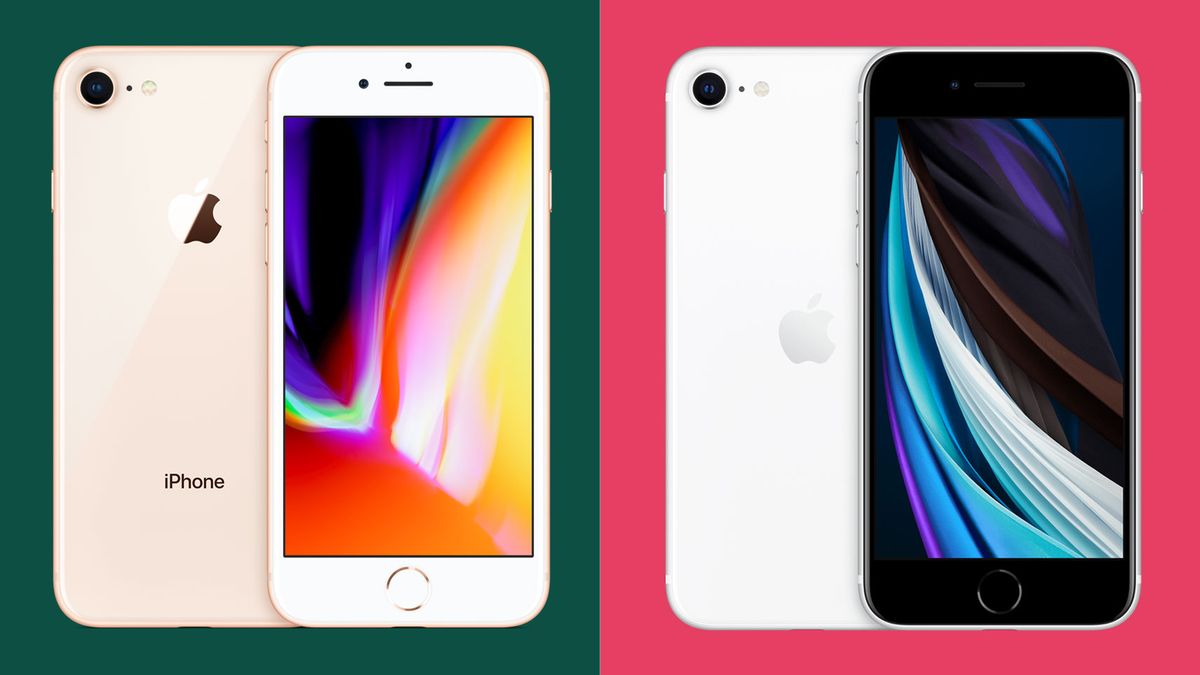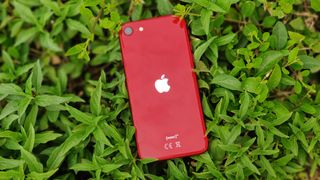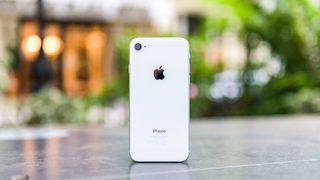iPhone SE vs iPhone 8: which cheaper Apple phone is made for you?
The new versus the old

The iPhone SE (2020) and iPhone 8 look very similar. On paper they seem almost the same too. So should you save a few dollars, or a handful if you shop around, and buy the older phone?
We think the iPhone SE is a better choice for most of you. While much of the hardware is the same, the phone has the same A13 Bionic processor seen in the iPhone 11.
That means it will stay fresh for years longer. It also adds dramatic improvements to the camera, and lets you play demanding games like Fornite at higher, or at least smoother, frame rates.
Which phone is best for you? Below we're going to explore the exact differences between the iPhone SE and the iPhone 8. Hopefully our insight can help explain which is best for you.
- Our full ranking of the best iPhones
iPhone SE vs iPhone 8 price
The iPhone 8 was the smaller flagship iPhone of choice in 2017 and 2018. It launched in September 2017 and remains to this day one of the best-selling Apple phones ever.
However, it was discontinued in April 2020 when the iPhone SE arrived. The SE is in fact a spruced-up iPhone 8 designed to bring in a whole new crowd of prospective iPhone owners who couldn’t afford one previously.
It costs $399 (£419 / AU$749) for the 64GB version, $449 (£469 / AU$829) with 128GB and $549 (£569 / AU$999) with 256GB. The entry-level iPhone SE is the most powerful phone at its price at the time of writing. And, yes, that includes Androids.
Get daily insight, inspiration and deals in your inbox
Sign up for breaking news, reviews, opinion, top tech deals, and more.
Apple’s iPhone 8 started at $699 (£699, AU$1079) back in 2017. But you can, of course, find it much cheaper in 2020. e spotted a “renewed” (refurbished) iPhone 8 at Amazon US for $274. Some UK retailers also sell the iPhone 8 for £399 at the time of publishing.
If you can save big on an “as new” iPhone 8, it may not be a bad buy. But, as we’ll see, if there’s just a small difference in cost you should go for the iPhone SE every time.
iPhone SE vs iPhone 8 design
Color is the only obvious difference between the iPhone 8 and iPhone SE when you take a quick look at these phones.
They have the same dimensions, 138.4 x 67.3 x 7.3 mm, and weigh a pleasantly light 148g. But where the iPhone SE comes in white, black and red, the iPhone 8 was made in grey, silver and gold colors.
Both have aluminium sides, and glass panels on front and back.
The first thing we noticed when reviewing the iPhone SE was how this design has aged in one respect. Their screens have a 16:9 shape, where almost every Android at the price has an 18:9 or taller display. This means there’s a lot of blank space above and below the screen.
However, this leaves room for the Touch ID fingerprint scanner. This is a lovely piece of hardware, one Apple does not use in its top-end phones. You place your thumb on it, and the phone unlocks near-instantly with a nice haptic “click”.


The one other outer hardware difference to mention here does not change a great deal. Apple’s iPhone 8 has a “3D Touch” screen, which lets it tell between a hard and soft press on the display. The SE does not.
At one point we thought this might become a big part of the iOS experience, but it never happened. 3D Touch support is going to be discontinued in iOS 14 anyway, so you don't need to consider that much.
Both phones have IP67 water resistance, an excellent feature at the iPhone SE’s $399. And they have a certain “small phone" charm missing in mid-range Androids. These iPhones are perfect for those not bothered about big-screen gaming and movie streaming.
iPhone SE vs iPhone 8 display
The iPhone SE and iPhone 8 display specs are the same. They have 4.7-inch 16:9 screens with LCD panels, True Tone color optimization and a 1334 x 750 resolution.
This seems a fairly low resolution in 2020, but it still provides Apple’s golden Retina pixel density. These little displays both look great.
Both are rated at 625 nits of brightness, enough for good clarity on bright days. Testing reveals the iPhone SE can actually go slightly brighter still, which is not a surprise for an Apple product.
The iPhone 8 has been around so long it has likely used ever-so-slightly different panels throughout its life. But they are going to be functionally very similar to the iPhone SE’s.
Both screens support HDR video too. However, thanks to the limits of the LCD panel, in color and contrast, the results aren’t quite as impressive as they would be on an iPhone 11 Pro. And is anyone really worried about HDR video quality on a 4.7-inch screen anyway?
iPhone SE vs iPhone 8 camera and battery

The camera is where this comparison gets quite interesting. These two phones have the same sensor, a 12-megapixel Sony chip with 1.22 micron sensor pixels. They have f/1.8 lenses and optical image stabilization. Both can shoot video at up to 4k resolution, 60 frames per second.
Take the two out for a shoot and you will see some important differences, though. The iPhone SE has much better dynamic range processing.
This means you’ll see fewer clipped highlights, particularly useful if you want to shoot right into the sun to capture a dramatic cloud photo.
These benefits affect 4K video and low-light shooting too. Where street lights at night might look like glowing orbs through the iPhone 8’s eyes, the iPhone SE brings them back down to a more realistic appearance, thanks to higher dynamic range.
The iPhone SE does not have the full Night shooting mode of the iPhone 11 Pro, which we found disappointing. But the extra imaging chops Apple squeezes out of familiar hardware impress.
The iPhone SE also has better video stabilization than the iPhone 8. Stick to 4K / 30fps shooting or lower to see the smoothest results.
Raw image quality improvements like this should convince the camera geeks, but there’s a more obvious camera change anyone can appreciate. The iPhone SE supports Portrait images, the iPhone 8 doesn’t.
This is where the phone works out the subject of your shot, and then blurs out the background for a look closer to an image taken with a larger wide-aperture lens. It’s the stuff of your next profile pic.
As the iPhone SE doesn’t have a second rear camera to use as a depth aid, Portrait only works for photos of people, not objects, but it’s another important win for the SE.

It’s one of the best phone camera experiences you can get for $399. Even the microphones are improved, for better audio clarity in your videos. However, the iPhone SE doesn’t have the upgraded camera of Apple’s more expensive iPhones. You get a 7MP sensor. It’s fine, but nothing special.
The two phones also have the same battery capacity, 1821mAh. Some narrow tests will see the iPhone SE last longer, thanks to power optimization, like video playback.
We don’t see a huge difference in real-world longevity here, though. The iPhone 8 and iPhone SE tend to last a day and no more, with little left in reserve to see you through to midnight on particularly busy days.
You might want to buy an external battery to keep in your bag. That said, those interested in these phones as a slick way to do the basics, with little interest in watching video or playing games, should get on with them just fine.
Bit of a social media addict? That counts as heavy use too. Consider the bump up to an iPhone 11 or iPhone XR, which last significantly longer.
iPhone SE vs iPhone 8 specs and features
The neat camera extras of the iPhone SE are made possible by the processor. It has the Apple A13 Bionic, the same chipset used in the iPhone 11 Pro Max.
This is surprising when you consider the iPhone SE is not only far cheaper, but also has a lower resolution screen so arguably needs less power to start with.
The iPhone 8 has the Apple A11 Bionic. It was killer back in 2017, but today? Well, it’s actually still pretty good. You can play games like Fornite, Call of Duty: Mobile and PUBG with no issues.
iOS will still feel great on an iPhone 8. However, there are some little nuggets of iPhone SE gold to find here too. For example, you can play Fornite at 60fps rather than 30.
An A13 Bionic is also very good news if you want a phone you’ll keep for several years. Apple tends to drop iOS update support for phones when they simply can’t handle the next generation of software well.
The iPhone SE has much greater headroom in this area. Not only is the processor more powerful, it has more RAM. The iPhone 8 has 2GB, the iPhone SE 3GB.
Two important iPhone features are still missing, though. The iPhone SE does not support Animojis or face unlocking, because it doesn’t have the face-tracking camera hardware required.
Face unlock we don’t mind, because Touch ID is great, but the silliness of Animojis is missed. You get Memoji stickers in both phones, but these static pics aren’t as fun.
iPhone SE vs iPhone 8 takeaway


The iPhone SE looks like an iPhone 8, but is a lot better in several important ways. A faster, newer processor should mean it is supported for a lot longer. Its power per dollar is stratospheric too.
The Apple A13 Bionic also enables significant improvements in the camera, even if the hardware is the same, or at least very similar. Images have greater dynamic range, night photos look better and you can use the background-blurring Portrait mode.
Only pick the iPhone 8 if you find it sold for significantly less than the iPhone SE.
Andrew is a freelance journalist and has been writing and editing for some of the UK's top tech and lifestyle publications including TrustedReviews, Stuff, T3, TechRadar, Lifehacker and others.
Most Popular

